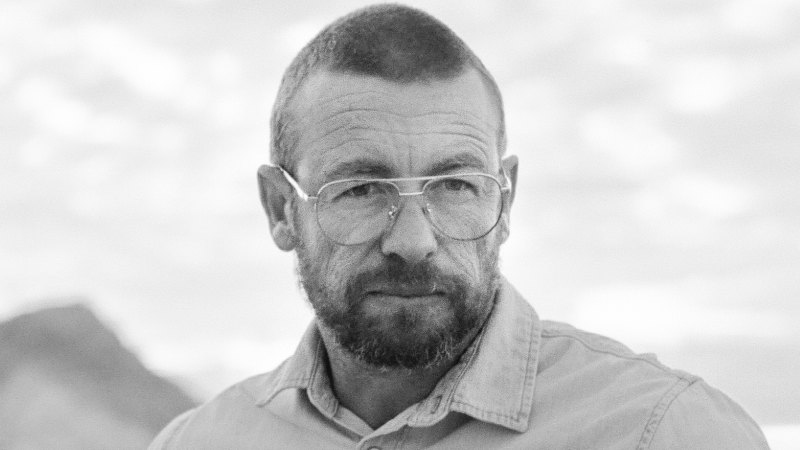By Stephanie Bunbury
Credit:
Save articles for later
Add articles to your saved list and come back to them any time.
One look at the screen and you can see that Simon Baker is right in his element with children. The erstwhile star of The Mentalist – one of Australia’s best-quality Hollywood exports – is barely recognisable as that golden boy of primetime in Limbo, Ivan Sen’s sparse crime drama set among the digs and craters of Coober Pedy. Travis is a hard-knuckled, dour trooper who left the drug squad with a secret heroin habit he still services regularly, but the smile on Baker’s face as he chaffs a small girl – “you’re a cheeky one” – shines through his character’s weariness.
“I love working with non-professionals and I love working with kids,” Baker says at the Berlinale, where the film is in competition. “It keeps you honest, it keeps you authentic and you realise how simple acting is. I think there’s a lot of performance with actors performing what their role is as an actor. They talk about it like it’s this great high art.” He remembers how much fun he had improvising with Chloe Moretz in another of his TV series, The Guardian. She was then four. “It’s often just like allowing it to happen.”
Simon Baker with Natasha Wanganeen in Limbo.Credit:Bunya Productions
Actually, Baker clearly brings considerable thought and intensity to playing Travis, a city cop who comes to Coober Pedy to investigate whether it is worth trying to reopen a cold case. Twenty years earlier, a young Aboriginal girl went missing from a party at a miner’s dug-out. Police showed no interest in the case, then tried unsuccessfully to pin it on the girl’s brother, Charlie (Rob Collins).
Local suspicion fell on Leon, a white prospector who was known to “like young Black girls”. Leon is now supposedly dead, but Travis visits his former dug-out where his brother Joseph (Nicholas Hope) now lives. Joseph points to a nearby makeshift grave. Leon’s there, he says. But is he? Out here, who would know?
Limbo is a mesmerising film, shot in a slightly faded black and white that makes the endless sea of mining craters look like the surface of the moon. Sen, best known for Mystery Road (2013) through its extended TV spin-off, says his stories always begin with a landscape.
“Everything I’ve done, it’s always been the landscape or the town. Somewhere to start. Just by going to Coober Pedy, being there, it just writes itself,” he says. “I’ve always been interested in the underground aspect of it and luckily nobody else had explored it too much in other films so I thought it was ripe and fresh. Especially the hotels.” The Limbo Motel where Travis stays is a luxe version of a miner’s dug-out, with dark stony corridors leading to rooms where you might easily imagine a rotten cop dying.
Simon Baker in Limbo.Credit:Bunya Productions
It’s a long way from Hollywood, in every sense. For the past few years, Baker has turned his back on syndicated series in favour of Australian stories. Two years ago he was in Berlin with High Ground, a western-style true story from the 1930s of an Indigenous warrior taking up arms against white settlers after a massacre, made by first-time feature director Stephen Johnson.
Next he made Blaze, a film about childhood trauma directed by artist and first-time director Del Kathryn Barton, which he chose because they spent three hours talking the first time they met. “A lot of it is about that. I don’t want to pour my heart and soul out on a set with people I don’t care about. I want to feel something! I’m sorry, I think I’ve just got to that age. And I love Ivan. I’ll have a relationship with him for the rest of his life, because we shared something. Because a connection happened.”
Simon Baker in, clockwise from main, Limbo, Blaze, Breath, Ride with the Devil and The Mentalist.Credit:
Baker moved to Los Angeles in the mid-’90s and almost immediately was cast in Curtis Hanson’s LA Confidential, along with Russell Crowe and Guy Pearce. He and his then wife would go on to have three children; he became a star of the new boom in television drama.
“I wanted to be a really good provider. So I put a lot of my artistic desires back here,” he says, indicating a back burner. “It was all fantastic, but there’s nothing I miss. There’s a lot of responsibility when you are the main character in a network TV show and you are largely responsible for the employment of 250 people.”
The Mentalist ran for 151 episodes between 2008 and 2015. “Just the creative process in that: how do I play this scene again? This moment again? Because it’s not written by Shakespeare. It’s nice now to explore different things and take more risks.”
I don’t want to pour my heart and soul out on a set with people I don’t care about.
There is no chewy dialogue in Limbo, because nobody says very much at all. Sen says he noticed people in Coober Pedy stand a long way from each other and say only what’s necessary. He found himself doing the same thing. “You stand 20 metres apart when you’re talking and it takes energy to project, so you’re not going into detailed philosophy,” he says. “It’s such a vast place, your words feel not worthy of existing. You’re quite small and your words are even smaller than that. It’s all-encompassing.”
For Baker, that meant finding his character in other ways. “There’s a lot of therapy-like work, internal work, which is getting to understand the actions of the character and the way he is. And I build from there.”
As it happens, he has an uncle who has spent most of his life in Coober Pedy, living underground and digging for opals. “I’d have Sundays off and go and have breakfast with him at the roadhouse. The physicality of my body was based slightly on the way he moves.” Shoulders slightly hunched, a loping walk, always seeming to be facing into a dusty headwind.
For anyone raised on midday movies, the outsider cop who comes to a troubled town is a familiar figure. So are the witnesses who refuse to talk; so is the blousy woman Emma (Natasha Wanganeen) who sees Travis as her best hope, despite being white and working for the police. Even the landscape is reminiscent of Death Valley, familiar from hundreds of westerns. Sen shot in black and white partly in order to conjure a cinephile nostalgia, although it is more of a conscious throwback to the existential empty spaces of Italian filmmakers such as Antonioni than to Hollywood B-movies.
Those genre elements, however, merely act as signposts. Solving the crime is beside the point. “What I think is more interesting about this film is that it’s a social study and, within that, a personal study of different characters,” says Baker. “As a byproduct of the case, you get swept up into this intergenerational trauma and the systemic issue of injustice within the legal system to First Australians. It’s like a bait and switch, done seamlessly.”
Coincidentally, an Indigenous girl was abducted in that area 20 years ago, but Sen didn’t base his story on that disappearance; he quotes a string of similar incidents, including one where police concluded that three children had “gone walkabout” despite one of them being only 12 months old.
“This is repeated all over Australia,” he says. It only stands to reason it would have happened in Coober Pedy. Looking at that land – mottled with holes, like Travis’ abused veins – you can imagine anything at all could happen there.
Limbo opens on May 18. Q&A screenings with Simon Baker and Ivan Sen take place at Melbourne’s Cinema Nova on May 13 at 2.20pm and Sydney’s Ritz Cinema on May 14 at 7pm.
Most Viewed in Culture
Source: Read Full Article





